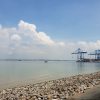
Forgotten coach who made accidental runners into Olympians
Published on April 10, 2022 | by freemalaysiatoday.com

IPOH: Perak track master Suppiah Ramalingam produced three Olympians, one of them within six months, and was key in Malaysia’s glory years of athletics in the 1960s.
One was former queen of speed M Rajamani, Malaysia’s first female Olympian, who qualified for the 400m at the 1964 Tokyo Olympics after 180 days under Suppiah.
Rajamani was thrust into Suppiah’s running world by her father V Mailvaganam to check her excessive sleeping.
She went on to be crowned two-time National Sportswoman of the Year, seven-time Seap Games gold medallist and an Asian Games gold medallist.

Suppiah, now 94, also had a considerable influence on Karu Selvaratnam, who rose from a water boy at his school sports meet to run the 400m hurdles and 4x400m relay at the 1964 Olympics.
A year later under Suppiah, Karu set a national record of 52.7s in the 400m hurdles, a mark that stood until Anto Keney Martin broke it by two-tenths of a second almost 25 years later.
Then there was double Olympian, Victor Asirvatham, who ran the 400m in Tokyo in 1964 and at Mexico four years later. He was called the “bull” for his raging runs and although he was only 165cm (5’5”) tall, he had longer strides than six-footers.
Other accidental runners who flourished in their early years under Suppiah included national 400m runner and former Malaysia coach K Jayabalan, AS Nathan (400m, 400m hurdles) and V Sangaran Kutty Nair (800m).
Tales of some of these athletes are told and retold as something wondrous, something verging on fairytale, but Suppiah remains forgotten.
Suppiah’s part in making Malaysia a track powerhouse is not even a footnote in the nation’s sporting history.
How is it that this legendary coach is not even in the Olympic Council of Malaysia’s Hall of Fame that rightly includes Rajamani and Karu, a former Malaysia captain of athletics and cricket?
It is commendable that Rajamani and the late Asirvatham were bestowed the datukship but all Suppiah has to show is the Pingat Jasa Kebaktian (PJK) which he received in 1978.
Decades after Suppiah made a major contribution to shaping Malaysian athletics, the frustration of being ignored still rankles.
“What has the nation done for me in recognition of my services to athletics?” he lamented. While his biggest joy was having produced Olympians, regional and national champions, “my sorrow is that I have been ignored”.

“I am glad that many people enjoyed my sporting journey with me but the nicest thing is when you are thanked and remembered.”
Childhood friend, L Pushpanathan, 93, said Suppiah had a way of getting the best out of his trainees and building a strong family of athletes.
Suppiah and Pushpanathan, both teachers in Ipoh, formed the Swifts, one of the pioneer running clubs in the country in the 1950s, to develop grassroots talent.
Suppiah was a slave driver, accentuated by the toughness of his training regimens.
His training method required athletes running repeatedly over a set distance, as Rajamani did, in scorching heat across rivers, up steep sandy dunes on tin-mining land and carrying weights under coconut trees at the YMCA ground.
“The real killer, however, was that each distance would be done at a faster speed than the one previous, while the recovery period in between would become progressively shorter,” said Suppiah.
The task came from a man, who had been trained by noodle maker Chye Kooi Loong and ran the 100m in 10.9s on grass, and who was also a champion hurdler.

Karu related a punishing episode at the national championships at Farrer Park in Singapore in 1965 when Suppiah was his coach.
He said he ran seven gruelling 400m races over the two-day competition, having been fielded for the 400m hurdles, 400m flat and the 4x400m relay.
Long before sports science and team psychologists came into vogue, Suppiah got into the head of Karu, “making me feel I could beat anyone”.
On the final day at Farrer Park, he won the 400m semi-final at 9am, broke the 400m hurdles national record five hours later and at 4pm beat a star-studded field to win the 400m in 48.4s.
“He took exceptional care of me and I owe him plenty for having taught me the basics in hurdling, which put me on the right path for my successes in later years,” said Karu.
Karu, who was under Suppiah’s guidance from 1958 to 1960 before he left Perak to join the Royal Malaysian Navy in Woodlands, Singapore, said his mentor’s achievements deserved to be valued and promoted.
Like Karu, Rajamani described Suppiah as a marvellous coach and a fine gentleman who stood untiringly by the side of his athletes.
“He bought me my first tracksuit when I went to Tokyo and paid his own fare to watch me in action as a spectator,” said Rajamani, who was known to many as “mummy long legs”.
Rajamani said Suppiah, along with her father, had to fend off snide remarks about a Ceylonese girl running around in shorts at a time when female athletes were a rarity.
The former teacher said while her father was her chief motivator and her biggest fan, Suppiah had also inspired her to put adversity behind and encouraged women to make a positive impact on their communities.
She holds the honour of being the first Malaysian of Indian descent to become a track athlete.
Suppiah’s dedication to athletics earned him Perak Coach of the Year award (1963-65) which paved the way for his coaching role in the national team from 1963-67.
He travelled widely to broaden his coaching skills and observe world class runners, paying his own fare to three Olympics – Tokyo 1964, Seoul 1988 and Sydney 2000 – and several other international meets.
Suppiah’s voice swelled with pride as he talked about his treasured collection of sports memorabilia.

They include a replica of the 1964 Tokyo Olympics torch that he carried in Kuala Lumpur, 60 volumes of hard-cover books on the Olympics, numerous commemorative medals and trophies and cups he had won as a sprinter from his school days.
What is the takeaway from this sad story of Suppiah’s life after sports?
Such questionable treatment of sportspeople is nasty and highlights the self-absorbed attitude of the custodians of sports – and people whom you thought were friends.
More stories
>>> The Territorial Army Founder Lines From Lambor Kiri
>>> Kilang kopi Antong masih menggunakan kaedah tradisional untuk pengeluaran kopinya
>>> 10 Malaysian football legends we need to remember
>>> History Of Cameron Highlands
>>> Forgotten Perak town was backdrop of Sybil Kathigasu’s heroism
>>> Town that grew from a tin tycoon’s mansion
>>> 7 Hollywood Movies Filmed in Malaysia
>>> Ipoh’s Concubine Lane draws foodies and tourists
>>> There’s a small, charming town near Ipoh that’s rich in biodiversity
>>> Hakka Villa To Reveal Revelational Past
>>> Ipoh Echo Readers’ Choice: Top 5 Ipoh Curry Mee
>>> Royal Belum Welcomes 10 Different Hornbill Species
>>> Ipoh Echo Reader’s Choice: Top 5 Kai Si Hor Fun In Ipoh
>>> Nostalgia: One Man’s Rubbish Is Another Man’s Collectable
>>> Han Chin Pet Soo
>>> 10 things about: Ruth Iversen Rollitt, an Ipoh girl at heart
>>> Nostalgia: Yeoh Ghim Khoon, Transport Entrepreneur
>>> ‘Ipoh Echo’: A community newspaper that has lasted 12 years and counting
>>> Arlene Terrace








